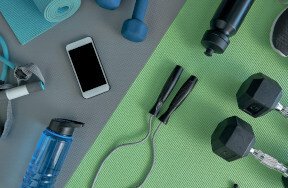Taking care of your eyesight and your vision is important when you're a kid. Besides eating lots of carrots, you should have regular eye exams to spot whether you have any problems with your vision as soon as possible! The sooner the eye doctor, who's called an optometrist, sees a problem, the sooner it can be fixed!
Eye Exams
You might be wondering what happens during an eye exam. First, the optometrist will do some different tests on your eyes to see if your vision is good. For example, he or she will have you read from a special eye chart that's got lines of letters and numbers on it in different sizes. You'll have to read the eye chart from left to right, first with one eye covered and then the other, so that the doctor can test both your eyes.
 Eye Chart
Eye Chart
If you need glasses or contact lenses, there's a special gadget - sort of like a big pair of glasses - that lets you try different prescriptions until you find the one that gives you the best and clearest vision. The doctor doing your eye exam may switch between different lenses and ask you which one looks the clearest to you. If you're really not sure, it's OK to say so - the doctor's job is to help you get the right prescription so your vision will be top-notch!
Vision Troubles
Nearsightedness and farsightedness are both common eye problems - lots of kids and adults have one or the other, but they're big words and can be confusing unless someone tells you what they mean! So here goes: nearsighted means you can see stuff that's near, like a book, but have trouble seeing stuff that's far away. Farsighted means you can see stuff that's far away, but have trouble seeing up close, like reading the print in a book. Another common eye problem is called astigmatism. This can make things look really blurry when you look at them.
Quick Fix
Glasses or contact lenses correct your vision because they let your eyes focus light in the right spot to get the clearest image. Because everyone's eyes are different, a pair of glasses that makes one person see perfectly may look really blurry to you. If you've ever tried on someone else's glasses, you totally know what we're talking about! If you need glasses or contact lenses, your doctor will write down your prescription - a piece of paper with numbers on it - which will get you the exact lenses that will correct the way your eye bends light.
Getting Glasses
You may be scared or upset about having to get glasses, but remember: they're going to make your sight a lot better and your life a lot easier! Plus, there is a FUN part about getting glasses: picking the frames. It can be fun to try different frames on. Choose ones that are comfortable and won't break, and make sure you like them, cause you'll be wearing them a lot! If you play sports, you may want to ask about eyewear you can wear on the field.
When you pick up your glasses, ask how to clean them properly and take care of them to make them last. It helps if you have a case to put them in when you're not wearing them. If you're gonna get contact lenses, you'll get some advice from the doctor on what kind will be best for you. Some are disposable (you wear them and throw them out) and others can be cleaned and used again.
Computer Vision Syndrome
A common vision problem for lots of kids today is computer vision syndrome. Many of us spend hours each day sitting in front of a computer, which can lead to symptoms like eyestrain, dry eyes, headaches, and neck and back pain. Asking kids how many hours they spend in front of the computer has become a pretty common question for lots of optometrists!
Want more info about your vision care? Visit www.healthchoices.ca.
































